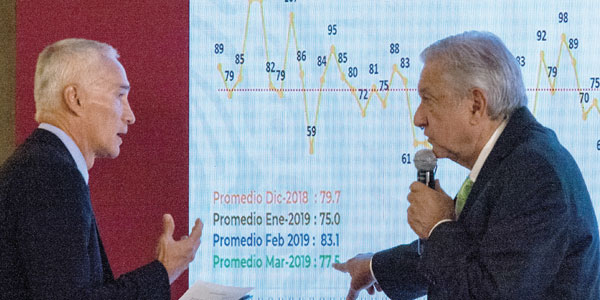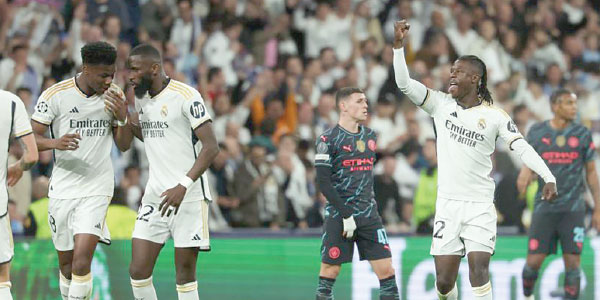
By Jorge Ramos
How do you challenge a president? In Mexico, you do it as directly as possible.
If Andrés Manuel López Obrador has changed anything, it’s that the Mexican president is now expected to show his face to the public on a regular basis. AMLO, as he is known, is perhaps the only president in the world who holds a news conference every working day, Monday through Friday. For over an hour, he answers journalists’ questions without censorship or restrictions, introducing his agenda for the coming news cycle.
That’s why I recently went to one of these morning conferences. I don’t understand why more journalists in Mexico, particularly AMLO’s critics, don’t take advantage of these opportunities. Such access would have been unthinkable under past Mexican presidents.
Violence remains the most serious problem facing the country. Over 128,000 people were murdered during the six-year administration of AMLO’s predecessor, Enrique Peña Nieto; 104,000 were murdered under Peña Nieto’s predecessor, Felipe Calderón. The killings haven’t stopped under López Obrador. According to the government’s own statistics, 2019 might prove to be the deadliest year in modern Mexican history. Armed with this data ― 8,524 Mexicans killed between December and February ― I went to one of AMLO’s news conferences earlier this month.
I’m always struck by the grandeur of Mexico City’s National Palace. That morning, I was also impressed by the dozens of journalists and cameramen given access to the president. I raised my hand, and when my turn came, I asked, “What will you do in the short term to stop the homicides?”
“We have the situation under control, according to our data,” the president answered.
“The data I have say otherwise,” I replied. “You aren’t controlling it. In fact, it is quite the opposite: Many Mexicans are still being murdered.”
This is the heart of the debate. The president and his minister of security, Alfonso Durazo, claim that intentional homicides are decreasing. Yet the official figures ― the government’s own figures ― suggest that Mexico is experiencing a particularly deadly year.
To be clear, we can’t blame López Obrador for a crisis he inherited from the last two presidents. But we also can’t accept the official narrative that his administration has already achieved results, and that things are improving. Do we have to wait for AMLO’s new crime-fighting National Guard to become operational before Mexicans stop dying?
Violence is the nation’s core problem, and the most relevant to its citizens. Which is why I was surprised that the issue social media picked up on, and that was most discussed by pundits, was the manner in which I questioned the president. My data didn’t match his, so I pointed it out to him. I also told AMLO that journalists never reveal their sources ― something he has demanded of the newspaper Reforma ― and I questioned his silence regarding the actions of President Donald Trump. That’s all. I wasn’t disrespectful. I addressed him only as “Mr. President.” My job is to ask questions. I was just trying to have a conversation, which is why I didn’t wait several minutes for him to answer each one. It’s a matter of journalistic style, one that I find is more natural and yields more information. This is the way I’ve worked for decades, with both presidents and dictators ― whether I’m interviewing Donald Trump or Nicolás Maduro, Enrique Peña Nieto or Hugo Chávez, Ernesto Zedillo or Fidel Castro. If, during the news conference, I went up to the president’s podium to look more closely at the homicide figures he had displayed on the screen, it was only because he had invited me to. We even shared a microphone.
It all seemed to go pretty well. Then something changed.
A few days after the news conference, AMLO praised “prudent” journalists and warned, “Now you know what happens when you overstep,” in a reference to the criticism my questioning of the president had received online.
The best journalists I know aren’t prudent at all. From the standpoint of leaders like López Obrador, they disobey their orders and overstep their boundaries all the time. But that kind of journalism is the only way powerful people can be challenged and held to account. AMLO himself behaved recklessly before he became president, rebelling against what he called the mafia of power. Now that he’s in charge, asking journalists to toe the line makes no sense.
Disagreeing with rulers is a key element of democracy. As is being able to discuss the issues of the day in a prudent manner and without fear of negative consequences (even if you might be slaughtered on social media). All of us, I think, could calm down a bit.
Confronting a president when his numbers don’t add up ― or when he asks a newspaper to do something unethical ― isn’t overstepping or being a rebel without a cause. It’s just journalism, plain and simple.
__________________________________________________________________________
Cuando Fui a ‘La Mañanera’ de AMLO
¿Cómo cuestionas al Presidente? En México, de frente.
Si algo ha cambiado el presidente Andrés Manuel López Obrador en el país es que da la cara. López Obrador, o AMLO, como lo conocen, es el único Presidente del mundo que realiza una conferencia de prensa diaria. Y ahí, por más de una hora, responde preguntas de periodistas — sin ningún tipo de censura o restricción — e impone su agenda en el ciclo noticioso del día.
Por eso fui a “la mañanera”. Para mí es difícil de entender cómo otros periodistas en México, particularmente los que critican a AMLO, no aprovechan esa oportunidad. Esto hubiera sido impensable con cualquier otro presidente mexicano. Sólo basta ir.
Creo que el problema más grave de México es que siguen asesinando a muchísima gente. Más de 128 mil personas murieron en el gobierno de Enrique Peña Nieto y 104 mil en el de Felipe Calderón. Así que hice mi tarea. Busqué los datos oficiales del propio gobierno de AMLO y me di cuenta que el 2019 podría convertirse en el año más violento en la historia moderna de México. Y con esos datos — 8.524 mexicanos asesinados en diciembre, enero y febrero — me fui a la conferencia de prensa.
Nunca deja de impresionar la majestuosidad del Palacio Nacional y, en esa mañana, el acceso de decenas de periodistas y camarógrafos al Presidente. Es algo verdaderamente inusual. Levanté la mano, llegó mi turno y pregunté. ¿Qué va a hacer a corto plazo para detener los asesinatos?
“Hemos controlado la situación, según nuestros datos”, me dijo el Presidente.
“Los datos que yo tengo dicen otra cosa”, le contesté. “No están controlando. Al contrario, siguen muriendo muchos mexicanos”.
Este es el verdadero debate. El Presidente y su Secretario de Seguridad, Alfonso Durazo, aseguran que los homicidios dolosos van a la baja. Ojalá. Las cifras, sus cifras, pintan un año sangriento.
Aclaración: No podemos culpar a AMLO de la terrible situación de criminalidad que le dejaron los dos gobiernos anteriores. Pero tampoco podemos aceptar la versión oficial de que ya hay resultados y que las cosas están mejorando. ¿O habrá que esperar años a que entre en funcionamiento la Guardia Nacional?
Ese es el problema de fondo. El más importante. Por eso me tomó por sorpresa que el debate político y en redes sociales se centrara en la manera en que cuestioné al Presidente. Mis datos no coincidían con los suyos. Y se lo dije. Le mencioné también que los periodistas nunca revelamos nuestras fuentes, como él lo había solicitado al diario Reforma, y lo cuestioné sobre sus silencios ante Donald Trump. Eso es todo. Y no fue una falta de respeto. En todo momento le llamé “señor Presidente”.
Pero mi trabajo es preguntar. Y, reconozco, tuve absoluta libertad para hacer mis preguntas. Mi propósito era tener una conversación con AMLO; no esperar varios minutos por cada respuesta. Es una cuestión de estilo periodístico; es más natural y genera más información. Así lo he hecho durante décadas, igual con presidentes que dictadores, desde Donald Trump, Hugo Chávez, Nicolás Maduro y Fidel Castro hasta Carlos Salinas de Gortari, Ernesto Zedillo, Felipe Calderón, Vicente Fox y Enrique Peña Nieto. Y si acompañé al Presidente en la tarima, para ver una pantalla con sus cifras de homicidios, es porque él lo permitió. Incluso hasta compartimos micrófono.
Hasta ahí todo estuvo bien. Luego, algo pasó.
Días después AMLO alabó a los periodistas “prudentes” y advirtió: “Si ustedes se pasan, ya saben lo que les pasa”. Pero los mejores reporteros que conozco no son prudentes, suelen desobedecer y, ante los ojos de los gobernantes, se pasan. Es la única manera de enfrentar a los poderosos. De hecho, AMLO fue imprudente — rebelándose ante lo que él llama la “mafia del poder” — antes de llegar a la presidencia. Ahora, en el poder, no cuadra que les pida otra cosa a los periodistas.
Una parte importante del ejercicio democrático es estar en desacuerdo con los gobernantes. Y debatir con ellos sin que pase nada (aunque te masacren en las redes). Todos, creo, le podemos bajar dos rayitas.
Cuestionar a un presidente cuando sus sumas y restas no salen — o cuando le pide a un diario violar la ética periodística — no es pasarse, ni excederse, ni ser un rebelde sin causa. Eso es, simplemente, periodismo.









